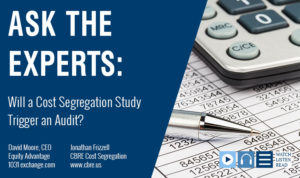 The FEA and Coalition Partners announced their economic study finds repeal of §1031 would Hurt Small Businesses and reduce GDP at a Capitol Hill press event. On March 17, 2015, the Coalition hosted a press briefing featuring small business owners and industry professionals who described how like-kind Exchanges helped their businesses and explained how repeal of Section 1031 would hurt their industries. At the briefing on Capitol Hill, nine speakers, including GAC co-chairs Suzanne Goldstein Baker and Max Hansen, spoke about the effects of a potential repeal of Section 1031.
The FEA and Coalition Partners announced their economic study finds repeal of §1031 would Hurt Small Businesses and reduce GDP at a Capitol Hill press event. On March 17, 2015, the Coalition hosted a press briefing featuring small business owners and industry professionals who described how like-kind Exchanges helped their businesses and explained how repeal of Section 1031 would hurt their industries. At the briefing on Capitol Hill, nine speakers, including GAC co-chairs Suzanne Goldstein Baker and Max Hansen, spoke about the effects of a potential repeal of Section 1031.
The Section 1031 Like-Kind Exchange Coalition (“Coalition”), of which FEA is a member, released a study, “Economic Impact of Repealing Like-Kind Exchange Rules,” on Tuesday morning, concluding that repealing the I.R.C. Section 1031 like-kind Exchange rules would slow economic growth, reduce GDP and hurt many U.S. small businesses.
Ernst & Young was commissioned to conduct the study in response to legislative proposals to repeal Section 1031, and concludes that the reduction in GDP would be driven primarily by decreased business investment due to increased cost of capital.
Ernst & Young Economic Study Overview – §1031 Tax Reform
The study confirmed that repeal of Section 1031 would negatively impact businesses and taxpayers, and that the negative effects would affect all taxpayers through a smaller economy. Findings show that the impact would be concentrated in industries that are heavily dependent on the use of §1031 like-kind Exchanges, including real estate, vehicle and equipment leasing and rental, truck transportation, and construction.
[box] Reduction of the Velocity of Investment: Longer holding periods reduce the velocity of investment, meaning capital is redeployed in the economy more slowly.[/box]
[box] Higher Cost of Capital: Even when combined with combined with lower taxes, the higher cost of capital negatively affects the economy across different uses of the associated revenue.[/box]
[box] Increased Holding Periods: Survey respondents of both personal property and real estate like-kind Exchange activity expect that asset holding periods would increase by more than 20% under repeal.[/box]
[box] Increased Reliance on Debt Financing: Repeal would increase the cost of equity financing, as businesses would pay tax upon sale. This makes debt financing relatively less expensive. Consequently, businesses may increase their leverage by borrowing funds. [/box]
[box]Reduction of the Velocity of Investment: Longer holding periods reduce the velocity of investment, meaning capital is redeployed in the economy more slowly.[/box]
The findings of the Ernst & Young study quantify that a repeal of the like-kind Exchange provisions to pay for a corporate rate cut, corporate tax reductions, or to fund increased spending, would unequivocally result in lower economic growth in the U.S. economy.
These findings demonstrate that a repeal of Section 1031 would be contrary to the stated goals of tax reform, namely: economic growth, revenue neutrality and fairness.
The study was authored by the Ernst & Young Quantitative Economics and Statistics team led by Robert J. Carroll, PhD, its National Director. Dr. Carroll previously served as Deputy Assistant Secretary for Tax Analysis of the US Treasury Department where he was the Department’s top economist working on tax policy issues. He is also a former Senior Economist with the President’s Council on Economic Advisers.
The Section 1031 Like-Kind Exchange Coalition is comprised of 12 diverse industry associations whose members represent more than one million U.S. businesses and taxpayers that will be severely impacted should Section 1031 be repealed.
Read the Coalition press release here (PDF)
Read the FEA press release here (PDF)
Read an overview and more about the study at www.1031taxreform.com/1031economics








